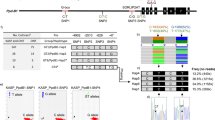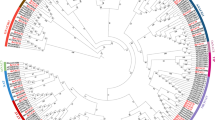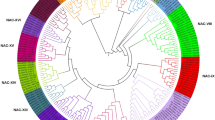Abstract
The WRKY family has been found in 14 plant species, and its members are mostly involved in plant stress resistance. Apricot (Prunus armeniaca L.) trees are extremely drought tolerant, but the molecular mechanisms have not yet been elucidated. Therefore, we investigated the WRKY gene family in apricot and analyzed the gene expression patterns in response to drought stress. A total of 56 candidate WRKY genes (PaWRKY1–56) were identified in the apricot genome. The putative proteins contain 162–1055 amino acids, with an isoelectric point of 5.0–9.68 and molecular weight of 18.76–114.2 Da. The PaWRKY family has a heptapeptide domain (WRKY) and zinc finger domain (CX5-7CX22-23HXH), which show differential variations among three groups. Group I has 12 members, with 2 WRKY and zinc finger domains located at the C and N terminus, respectively. Group II can be further divided into II-b, II-c, II-d, and II-e, with 10, 13, 6, and 7 members, respectively. Group III has eight members. Members of groups II and III have one WRKY and one zinc finger domain. Fifty-one PaWRKY genes are unevenly distributed across eight linkage groups. Only one tandem repeat event was detected, and gene duplication was identified as the main factor driving gene evolution. A total of 28 PaWRKY genes responded to the drought–rehydration treatment. In particular, drought stress up-regulated PaWRKY11/14/48 expression and down-regulated PaWRKY23 expression. The genome-wide identification, functional characterization, and evolutionary analysis of the PaWRKY family yield new insights into the role of WRKY in the drought tolerance of apricot trees.







Similar content being viewed by others
Data availability
Data are available upon request to the corresponded author.
References
Abeysinghe JK, Lam KM, Ng DW (2019) Differential regulation and interaction of homoeologous WRKY18 and WRKY40 in Arabidopsis allotetraploids and biotic stress responses. Plant J 97:352–367
Besseau S, Li J, Palva ET (2012) WRKY54 and WRKY70 co-operate as negative regulators of leaf senescence in Arabidopsis thaliana. J Exp Bot 63:2667–2679
Cai Y, Chen X, Xie K, Xing Q, Wu Y, Jing L, Du C, Sun Z, Guo Z, Zhang J (2014) Dlf1, a WRKY transcription factor, is involved in the control of flowering time and plant height in rice. PLoS ONE 9:e102529
Chen S, Weng Q, Cao H, Sun X (2017) The functions and regulation mechanisms of WRKY transcription factors in response to biotic and abiotic stresses. J Agricultural Biotechnol 25(4):668–682
Chen C, Xia R, Chen H, He Y (2018a) TBtools, a Toolkit for biologists integrating various HTS-data handling tools with a user-friendly interface. bioRxiv:289660
Chen F, Hu Y, Alessandro V, Wu K, Cai H (2018b) The WRKY transcription factor family in model plants and crops. Crit Reviews Plant ences 36:1–25
Chen P, Liu Q (2019a) Genome-wide characterization of the WRKY gene family in cultivated strawberry (Fragaria × ananassa Duch.) And the importance of several group III members in continuous cropping. Sci Rep 9:8423
Chen X, Li C, Wang H, Guo Z (2019b) WRKY transcription factors: evolution, binding, and action. Phytopathol Res 1:1–13
Chen C, Chen H, Zhang Y, Thomas HR, Frank MH, He Y, Xia R (2020a) TBtools: an integrative toolkit developed for interactive analyses of big biological data. Mol Plant 13:1194–1202
Chen C, Chen X, Han J, Lu W, Ren Z (2020b) Genome-wide analysis of the WRKY gene family in the cucumber genome and transcriptome-wide identification of WRKY transcription factors that respond to biotic and abiotic stresses. BMC Plant Biol 20:443
Ding M, Chen J, Jiang Y, Lin L, Cao Y, Wang M, Zhang Y, Rong J, Ye W (2015) Genome-wide investigation and transcriptome analysis of the WRKY gene family in Gossypium. Mol Genet Genomics 290:151–171
Dong J, Chen C, Chen Z (2003) Expression profiles of the Arabidopsis WRKY gene superfamily during plant defense response. Plant Mol Biol 51:21–37
Gu Y, Ji Z, Chi F (2015) Bioinformatics and expression analysis of the WRKY gene family in apple. Scientia Agricultura Sinica 48:3221–3238
Gu Y, Ji Z, Chen F, Qiao Z, Xu C, Zhang J, Zhou Z, Dong Q (2017) Genome-wide identification and expression analysis of the WRKY gene family in peach. Acta Agriculturae Boreali-Sinica 38:254–270
Guo J, Li S, Li H, Li W, Li D (2021) Expression of the kale WRKY gene BoWRKY10 in transgenic tobacco confers drought stress tolerance. Russ J Plant Physiol 68:147–157
Hu L, Ye M, Li R, Zhang T, Lou Y (2015) The rice transcription factor WRKY53 suppresses herbivore-induced fefenses by acting as a negative feedback modulator of mitogen-activated protein kinase activity. Plant Physiol 169:2907–2921
Huangfu J, Li J, Li R, Ye M, Kuai P, Zhang T, Lou Y (2016) The transcription factor OsWRKY45 negatively modulates the resistance of rice to the brown planthopper nilaparvata lugens. Int J Mol ences 17:697
Jiang F, Zhang J, Wang S, Yang L, Wang Y (2019) The apricot (Prunus armeniaca L.) genome elucidates Rosaceae evolution and beta-carotenoid synthesis. Hortic Res 6:128
Kong W, Yu K, Dan N, Yang S, Bao M, Huang X, Fu X (2017) Genome-wide identification and expression analysis of WRKY transcription factor under sbiotic stress in Beta vulgaris. Scientia Agricultura Sinica 50:3259–3273
Krishnamurthy P, Vishal B, Ho WJ, Lok FC, Lee FS, Kumar PP (2020) Regulation of a cytochrome P450 gene CYP94B1 by WRKY33 transcription factor controls apoplastic barrier formation in roots to confer salt tolerance. Plant Physiol 184:2199–2215
Kumar S, Stecher G, Li M, Knyaz C, Tamura K (2018) MEGA X: molecular evolutionary genetics analysis across computing platforms. Mol Biol Evol 35:1547–1549
Li D, Liu P, Yu J, Wang L, Dossa K, Zhang Y, Zhou R, Wei X, Zhang X (2017) Genome-wide analysis of WRKY gene family in the sesame genome and identification of the WRKY genes involved in responses to abiotic stresses. BMC Plant Biol 17:152
Ma C, Jing C, Chang B, Yan J, Liang B, Liu L, Yang Y, Zhao Z (2018) The effect of promoter methylation on MdMYB1 expression determines the level of anthocyanin accumulation in skins of two non-red apple cultivars. BMC Plant Biol 18:108
Qi S, Shang Y, Du M, Du J (2007) Progress on plant WRKY transcription factor.Chinese Agricultural Science Bulletin:104–108
Qi Y, Wang L, Wang Y, Pu G, Liu Q, Zhang Y (2019) Function and mechanism of WRKY transcription factors of plants under abiotic stress. Mol Plant Breed 17:5973–5979
Qiao Z, Li C, Wei Z (2016) WRKY1 regulates stomatal movement in drought-stressed Arabidopsis thaliana. Plant Mol Biol 91:53–65
Rajappa S, Krishnamurthy P, Kumar P (2020) Regulation of AtKUP2 expression by bHLH and WRKY transcription factors helps to confer increased salt tolerance to Arabidopsis thaliana plants.Frontiers in Plant Science11
Simura J, Antoniadi I, Siroka J, Tarkowska D, Strnad M, Ljung K, Novak O (2018) Plant hormonomics: multiple phytohormone profiling by targeted metabolomics. Plant Physiol 177:476–489
Šircelj H, Tausz M, Grill D, Batič F (2007) Detecting different levels of drought stress in apple trees (Malus domestica Borkh.) With selected biochemical and physiological parameters. Sci Hort 113:362–369
Sun C, Palmqvist S, Olsson H, Borén M, Ahlandsberg S, Jansson C (2003) A novel WRKY transcription factor, SUSIBA2, participates in sugar signaling in barley by binding to the sugar-responsive elements of the iso1 promoter. THE PLANT CELL ONLINE 15:2076–2092
Wang N, Zhang Z, Huang F, Hong-You L, Zhang S (2014) Advance on the role of WRKY transcription factors in abiotic stress response. J Nuclear Agricultural Sci 28:1819–1827
Wang Y, Feng L, Zhu Y, Li Y, Yan H (2015) Comparative genomic analysis of the WRKY III gene family in populus, grape, arabidopsis and rice. Biol Direct 10:48
Waterhouse AM, Procter JB, Martin DM, Clamp M, Barton GJ (2009) Jalview Version 2–a multiple sequence alignment editor and analysis workbench. Bioinformatics 25:1189–1191
Wei X, Yao W, Jiang T, Zhou B (2016) Identification of WRKY gene in response to abiotic stress from WRKY transcription factor gene family of Arabidopsis thaliana. J Northeast Forestry Univ 44(10):45–48
Wu G, Li Z, Cao H, Wang J (2019) Genome-wide identification and expression analysis of the WRKY genes in sugar beet (Beta vulgaris L.) under alkaline stress. PeerJ Preprints
Xie T, Chen C, Li C, Liu J, Liu C, He Y (2018) Genome-wide investigation of WRKY gene family in pineapple: evolution and expression profiles during development and stress. BMC Genomics 19:490
Zhao X, Wu X, Zhang X, Yuan L, Li L, Tang H, Cui Q (2018) A new very early-maturing apricot cultivar ‘Jinhe’. Acta Horticulturae Sinica 45:1417–1418
Acknowledgements
This work was supported by the Talents Construction Project of Science and Technology Innovation, Hebei Academy of Agriculture and Forestry Sciences (No. C19R0701), the Innovation Team Project of Hebei Academy of Agricultural and Forestry Sciences (No. F20e06001-3), the Key R & D project of Hebei Province (No. 21326310D), and the Key Laboratory of Biology and Genetic Improvement of Horticultural Crops (Germplasm Resources Utilization), Ministry of Agriculture, P.R.China (No. NYZS202103).
Author information
Authors and Affiliations
Contributions
CJ and XW perceived and planned the study. Experimentation and data analysis was done by CJ, DW, ZL, and XC. The manuscript was written by CJ, ZL, and DW. CJ, DW, and HD edited the manuscript. All authors discussed the results and contributed to the final manuscript.
Corresponding author
Ethics declarations
Conflict of interest
The authors declare that there is no conflict of interest regarding the publication of this paper.
Additional information
Communicated by Ali Sarkhosh.
Publisher’s note
Springer Nature remains neutral with regard to jurisdictional claims in published maps and institutional affiliations.
Electronic supplementary material
Below is the link to the electronic supplementary material.
Rights and permissions
Springer Nature or its licensor (e.g. a society or other partner) holds exclusive rights to this article under a publishing agreement with the author(s) or other rightsholder(s); author self-archiving of the accepted manuscript version of this article is solely governed by the terms of such publishing agreement and applicable law.
About this article
Cite this article
Jing, C., Wang, D., Liu, Z. et al. Identification of the WRKY gene family in apricot and its response to drought stress. Hortic. Environ. Biotechnol. 64, 269–282 (2023). https://doi.org/10.1007/s13580-022-00465-z
Received:
Revised:
Accepted:
Published:
Issue Date:
DOI: https://doi.org/10.1007/s13580-022-00465-z




